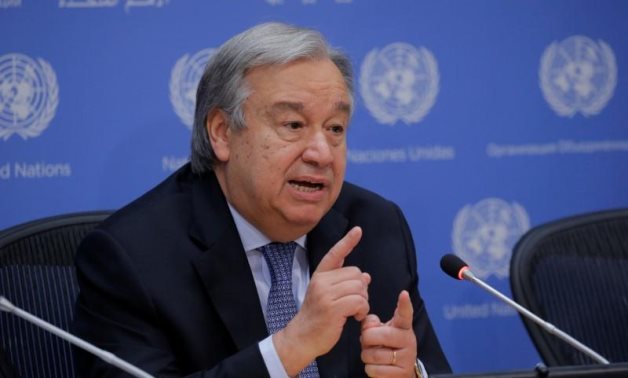
FILE PHOTO: United Nations Secretary-General Antonio Guterres takes part in a news conference at the United Nations headquarters in New York, U.S., June 20, 2017. REUTERS/Lucas Jackson
The COVID-19 pandemic has exposed fault lines, fissures and fragilities in societies and economies around the world – and the Arab region is no exception.
The region is blessed with tremendous diversity and potential. Yet all Arab countries – whether oil-rich, middle-income or least developed – face difficulties in responding.
The global pandemic has revealed endemic challenges.
The regional economy has suffered multiple shocks — from the virusas well as the sharp drop in oil prices, remittances and tourism.
Economic forecasts stand at 50-year lows.
The regional economy is expected to shrink by more than 5 per cent- with some countries facing double-digit contractions.
With millions more pushed down the economic ladder, fully one-quarter of the Arab population may live in poverty.
In a region already rife with tensions and inequalities, this will have profound consequences on political and social stability.
Some communities are especially hard hit — including women, migrants — who represent 40% of the workforce — and the 55 million people who already rely on lifesaving humanitarian assistance.
Those caught in armed conflict face particular challenges, especially the 26 million refugees and internally displaced persons, who are among the most exposed to the virus.
But the COVID-19 pandemic can also be a moment for resolving long-standing conflicts and addressing structural weaknesses.
Four sets of prioritiescan guide the response to build back better and achieve the Sustainable Development Goals.
First, immediate measures to slow the spread of the disease, end conflict and meet the urgent needs of the most vulnerable.
That means prioritising life-saving health care to COVID-19 victims, respecting the call for a global ceasefire; ensuring humanitarian assistance to the most vulnerable — including refugees, displaced and host communities; providing emergency support to individuals and households; andtaking steps to relieve debt, promote trade and expand relief — for example, through a regional solidarity fund.
Second, we must deepen efforts to address inequalities by investing in universal health and education; social protection floors; and technology.
The region is home to the world’s largest gender gap in human development. COVID-19 recovery is an opportunity to invest in women and girls, ensure equal rights and participation — which will have lasting benefits for all.
Education and opportunities are also critical for young people in the region who face unemployment ratesfive times higher than those for adults. With the right investments, Arab youth —now the largest age group in the region —can also be its largest asset.
Third, boosting the economic recovery through reimagining the region’s economic model in favour of more diversified, green economies.
That means creating decent sustainable jobs; introducing progressive taxation measures; ending fossil fuel subsidies; and taking greater account of climate risks.
Fourth, now is the moment to prioritize human rights, ensure a vibrant civil society and free media and create more accountable institutions that will increase citizen trust and strengthen the social contract.
All of these steps are pivotal to helping the Arab region build back better and enhancingits ability to withstand future shocks.
The Arab region can get there by making the most of the remarkable potential, compassion and ingenuity of its people.
Together, we can turn a crisis into an opportunity. It will be good for the region — and good for our world.
António Guterres is the Secretary-General of the United Nations
Comments
Leave a Comment